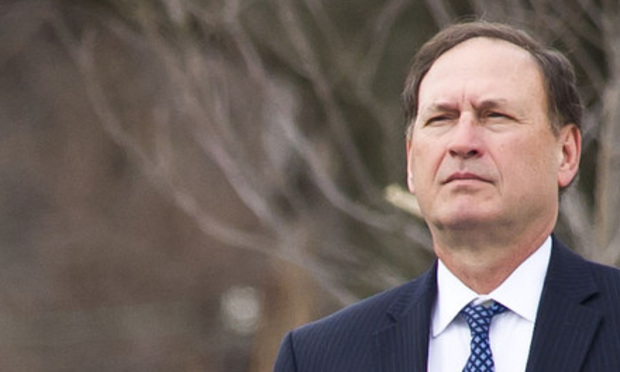Conservative Samuel Alito Channels Liberal Icon Thurgood Marshall on Religion
"It is remarkable how the politics of religious accommodation have changed," one lawyer remarked.
January 24, 2019 at 03:13 PM
5 minute read
 Justice Samuel Alito Jr. Credit: Diego M. Radzinschi / ALM
Justice Samuel Alito Jr. Credit: Diego M. Radzinschi / ALM
Justice Samuel Alito Jr., perhaps the Supreme Court's most reliable conservative, and the late Justice Thurgood Marshall, one of the court's liberal lions, would seem to be polar opposites as judges. But as an Alito opinion this week showed, they may have found some common ground on religious freedom.
In a case about prayer by a high school football coach, Alito hinted the justices should revisit two seminal religious discrimination decisions, both of which Marshall also thought were wrongly decided in 1977 and 1990.
The incongruous alignment of Alito and Marshall was not lost on constitutional scholars. The two precedents targeted by Alito “limit the degree to which religion can be used to gain 'exemptions' from generally applicable laws and/or workplace policies,” Eli Savit of the University of Michigan Law School noted on Twitter. Marshall and his colleagues on the left had dissented in both.
In Tuesday's case, justices on the right—not the left—questioned the precedents. Alito was joined by Justices Clarence Thomas, Neil Gorsuch and Brett Kavanaugh. Together, they have the four votes needed to revisit—in an appropriate case—the majority decision that Justice Antonin Scalia wrote in Employment Division v. Smith, and Justice Byron White's majority opinion in Trans World Airlines v. Hardison.
“It is remarkable how the politics of religious accommodation have changed,” tweeted former U.S. Justice Department civil rights litigator Sasha Samberg-Champion of Relman, Dane & Colfax.
The justices on Tuesday denied review, without dissent, in the case Kennedy v. Bremerton School District. The coach, Joseph Kennedy, claimed he lost his job in the Bremerton School District because he engaged in conduct protected by the First Amendment's free speech clause. He had ignored district orders to stop praying silently on the 50-yard line after each football game.
Alito wrote a separate “statement” in which he said Kennedy had live claims under the free exercise clause and Title VII of the 1964 Civil Rights Act. “Petitioner's decision to rely primarily on his free speech claims as opposed to these alternative claims may be due to certain decisions of this court,” Alito wrote.
Those “certain decisions,” according to Alito, were Smith and Hardison.
Since joining the court in 2006, Alito has made religious accommodation one of his signature issues.
In recent speeches, including one in 2016 before the Federalist Society, Alito has spoken of religious freedom as being “in even greater danger” than other “constitutional fault lines,” such as the Second Amendment. “It's not dark yet, but it's getting there,” Alito said, quoting singer Bob Dylan.
And his strong views on religious freedom were evident in his majority opinion in Burwell v. Hobby Lobby Stores, finding that the federal obligation to provide contraceptive insurance to employees violates the religious beliefs of a corporation and its owners under the Religious Freedom Restoration Act, and also in his same-sex marriage dissent in Obergefell v. Hodges.
In Scalia's 1990 Smith decision, the justice said the Constitution “does not relieve an individual of the obligation to comply with a valid and neutral law of general applicability on the ground that the law proscribes (or prescribes) conduct that his religion prescribes (or proscribes).”
White wrote in his Hardison ruling: “To require [Trans World Airlines] to bear more than a de minimis cost in order to give Hardison Saturdays off is an undue hardship. In the absence of clear statutory language or legislative history to the contrary, we will not readily construe the statute to require an employer to discriminate against some employees in order to enable others to observe their Sabbath.”
 Supreme Court Justice Thurgood Marshall. June 13, 1967. LBJ Library photo by Frank Wolfe.
Supreme Court Justice Thurgood Marshall. June 13, 1967. LBJ Library photo by Frank Wolfe.Marshall's dissent in the Trans World Airlines case, joined by Justice William Brennan, questioned whether the company had exhausted the possible accommodations for Hardison, who worked in an airline maintenance department.
“As a matter of law, I seriously question whether simple English usage permits 'undue hardship' to be interpreted to mean 'more than de minimis cost,' especially when the examples the guidelines give of possible undue hardship is the absence of a qualified substitute,” Marshall wrote in his dissent in the Trans World Airlines case. “I therefore believe that in the appropriate case we would be compelled to confront the constitutionality of requiring employers to bear more than de minimis costs.”
Alito noted at the end of his statement in the school prayer case this week that the justices had not been asked to revisit the Smith and Hardison decisions.
No one would seriously claim that Alito follows in the footsteps of Marshall or Brennan, widely known for their expansive views of individual civil rights.
In a recent law review article, Neil Siegel of Duke University School of Law described Alito, since the death of Scalia, as the “primary judicial voice of the many millions of Americans who appear to be losing the culture wars, including in battles over gay rights, women's access to reproductive healthcare, affirmative action, and religious exemptions.”
This content has been archived. It is available through our partners, LexisNexis® and Bloomberg Law.
To view this content, please continue to their sites.
Not a Lexis Subscriber?
Subscribe Now
Not a Bloomberg Law Subscriber?
Subscribe Now
NOT FOR REPRINT
© 2025 ALM Global, LLC, All Rights Reserved. Request academic re-use from www.copyright.com. All other uses, submit a request to [email protected]. For more information visit Asset & Logo Licensing.
You Might Like
View All
4th Circuit Upholds Virginia Law Restricting Online Court Records Access
3 minute read
Supreme Court Considers Reviving Lawsuit Over Fatal Traffic Stop Shooting

Is 1st Circuit the New Center for Trump Policy Challenges?

Insurance Policies Don’t Cover Home Depot's Data Breach Costs, 6th Circuit Says
Trending Stories
- 1No Two Wildfires Alike: Lawyers Take Different Legal Strategies in California
- 2Poop-Themed Dog Toy OK as Parody, but Still Tarnished Jack Daniel’s Brand, Court Says
- 3Meet the New President of NY's Association of Trial Court Jurists
- 4Lawyers' Phones Are Ringing: What Should Employers Do If ICE Raids Their Business?
- 5Freshfields Hires Ex-SEC Corporate Finance Director in Silicon Valley
Who Got The Work
J. Brugh Lower of Gibbons has entered an appearance for industrial equipment supplier Devco Corporation in a pending trademark infringement lawsuit. The suit, accusing the defendant of selling knock-off Graco products, was filed Dec. 18 in New Jersey District Court by Rivkin Radler on behalf of Graco Inc. and Graco Minnesota. The case, assigned to U.S. District Judge Zahid N. Quraishi, is 3:24-cv-11294, Graco Inc. et al v. Devco Corporation.
Who Got The Work
Rebecca Maller-Stein and Kent A. Yalowitz of Arnold & Porter Kaye Scholer have entered their appearances for Hanaco Venture Capital and its executives, Lior Prosor and David Frankel, in a pending securities lawsuit. The action, filed on Dec. 24 in New York Southern District Court by Zell, Aron & Co. on behalf of Goldeneye Advisors, accuses the defendants of negligently and fraudulently managing the plaintiff's $1 million investment. The case, assigned to U.S. District Judge Vernon S. Broderick, is 1:24-cv-09918, Goldeneye Advisors, LLC v. Hanaco Venture Capital, Ltd. et al.
Who Got The Work
Attorneys from A&O Shearman has stepped in as defense counsel for Toronto-Dominion Bank and other defendants in a pending securities class action. The suit, filed Dec. 11 in New York Southern District Court by Bleichmar Fonti & Auld, accuses the defendants of concealing the bank's 'pervasive' deficiencies in regards to its compliance with the Bank Secrecy Act and the quality of its anti-money laundering controls. The case, assigned to U.S. District Judge Arun Subramanian, is 1:24-cv-09445, Gonzalez v. The Toronto-Dominion Bank et al.
Who Got The Work
Crown Castle International, a Pennsylvania company providing shared communications infrastructure, has turned to Luke D. Wolf of Gordon Rees Scully Mansukhani to fend off a pending breach-of-contract lawsuit. The court action, filed Nov. 25 in Michigan Eastern District Court by Hooper Hathaway PC on behalf of The Town Residences LLC, accuses Crown Castle of failing to transfer approximately $30,000 in utility payments from T-Mobile in breach of a roof-top lease and assignment agreement. The case, assigned to U.S. District Judge Susan K. Declercq, is 2:24-cv-13131, The Town Residences LLC v. T-Mobile US, Inc. et al.
Who Got The Work
Wilfred P. Coronato and Daniel M. Schwartz of McCarter & English have stepped in as defense counsel to Electrolux Home Products Inc. in a pending product liability lawsuit. The court action, filed Nov. 26 in New York Eastern District Court by Poulos Lopiccolo PC and Nagel Rice LLP on behalf of David Stern, alleges that the defendant's refrigerators’ drawers and shelving repeatedly break and fall apart within months after purchase. The case, assigned to U.S. District Judge Joan M. Azrack, is 2:24-cv-08204, Stern v. Electrolux Home Products, Inc.
Featured Firms
Law Offices of Gary Martin Hays & Associates, P.C.
(470) 294-1674
Law Offices of Mark E. Salomone
(857) 444-6468
Smith & Hassler
(713) 739-1250








